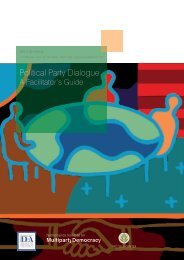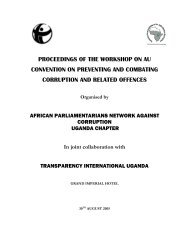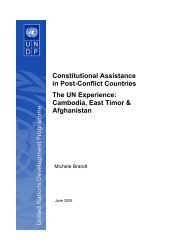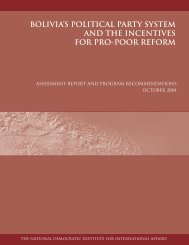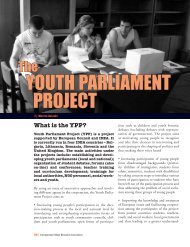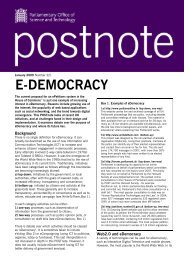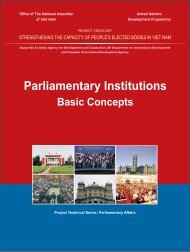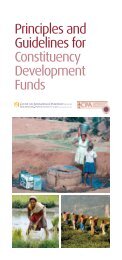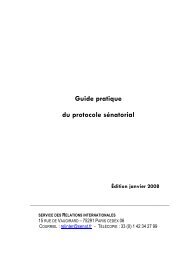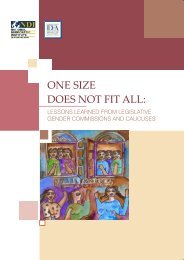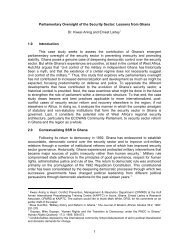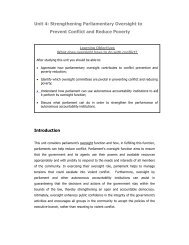The Constituent Assembly of Nepal: An Agenda for Women - CAPWIP
The Constituent Assembly of Nepal: An Agenda for Women - CAPWIP
The Constituent Assembly of Nepal: An Agenda for Women - CAPWIP
- No tags were found...
Create successful ePaper yourself
Turn your PDF publications into a flip-book with our unique Google optimized e-Paper software.
International IDEA - <strong>The</strong> <strong>Constituent</strong> <strong>Assembly</strong> <strong>of</strong> <strong>Nepal</strong>: <strong>An</strong> <strong>Agenda</strong> <strong>for</strong> <strong>Women</strong> Affirmative action <strong>for</strong> womenAgain, previous constitutions have permitted this (see above). Is there an argument <strong>for</strong> being more specific aboutthe types <strong>of</strong> affirmative action that is permitted? Or even <strong>for</strong> requiring rather than permitting affirmative action<strong>for</strong> disadvantaged groups? Quotas, special funding, incentives <strong>for</strong> entrepreneurship among women, genderawareness <strong>for</strong> others, and programmes to identify and remove barriers to women's participation are amongpossible special measures (not all would usually be called 'affirmative action'. <strong>The</strong> constitution should not be toodetailed in its prescriptions. CitizenshipCitizenship is treated in the law and the constitution <strong>of</strong> <strong>Nepal</strong> more as a privilege than a right. Manyindividuals, and whole communities, are unable claim their citizenship or its physical manifestation: thecitizenship certificate. <strong>Women</strong> are among the groups adversely affected, despite improvement in the InterimConstitution. <strong>Women</strong> might join with others to <strong>for</strong>mulate provisions that treat citizenship as a right, andensure that no bureaucratic requirements unreasonably stand in the way <strong>of</strong> achieving that right. Economic social and cultural rightsSo far these rights-which may include the right to a reasonable standard <strong>of</strong> health, right to education, right t<strong>of</strong>ood (and water) have not been recognized truly as rights. <strong>The</strong>y are <strong>of</strong> course important <strong>for</strong> all. Arguably, theyhave greater significance <strong>for</strong> women, at least in a society in which women cannot always make their ownchoices. Even if they are so recognized, there is a further question about how far specific issues related towomen should be mentioned. Reproductive health is one topic mentioned by the Interim Constitution.<strong>The</strong>re is good reason <strong>for</strong> mentioning this (thought its precise meaning would not be clear to the ordinaryreader or probably the ordinary lawyer). <strong>The</strong> objective is to open the way to freedom <strong>of</strong> reproductive choice<strong>for</strong> women-especially in relation to abortion and contraception. Is there any good reason <strong>for</strong> mentioninggender-specific issues in regard to any other right (such as access to water-where, <strong>for</strong> example, discriminationagainst Dalits in the use <strong>of</strong> water sources hits women especially hard)? Similarly, it is clear that there are specialissues <strong>for</strong> women in education, food and housing. It does not necessarily follow that a constitution couldusefully be explicit about these problems-<strong>for</strong> many problems, there are several solutions and a constitutionshould not be a straitjacket in the sense <strong>of</strong> restricting government policy choices. Exploitation <strong>of</strong> womenConstitutions have included provisions about exploitation in general terms and specifically about <strong>for</strong>cedlabour, including trafficking. <strong>The</strong> Interim Constitution includes a statement that custom must not be a basis<strong>for</strong> exploitation. Is there room <strong>for</strong> identification <strong>of</strong> specific issues affecting women-such as the kamlari system?Would it add anything to mention the position <strong>of</strong> widows? How about sex workers? Do such provisions addanything? More seriously, do they actually create problems? For example, there is room <strong>for</strong> differences <strong>of</strong> viewabout how to deal with prostitution. Criminalization is not necessarily the answer. If provisions aboutexploitation could be read as requiring a certain legal approach, this might in the long run be counterproductive.Sometimes in a constitution, 'less is more'. Domestic and other violence against womenViolence against women, in <strong>Nepal</strong> as in other countries, is a serious problem. <strong>The</strong> especially vulnerableposition <strong>of</strong> Dalit women is an additional issue. <strong>The</strong> Interim Constitution says it should not happen. But it is27



